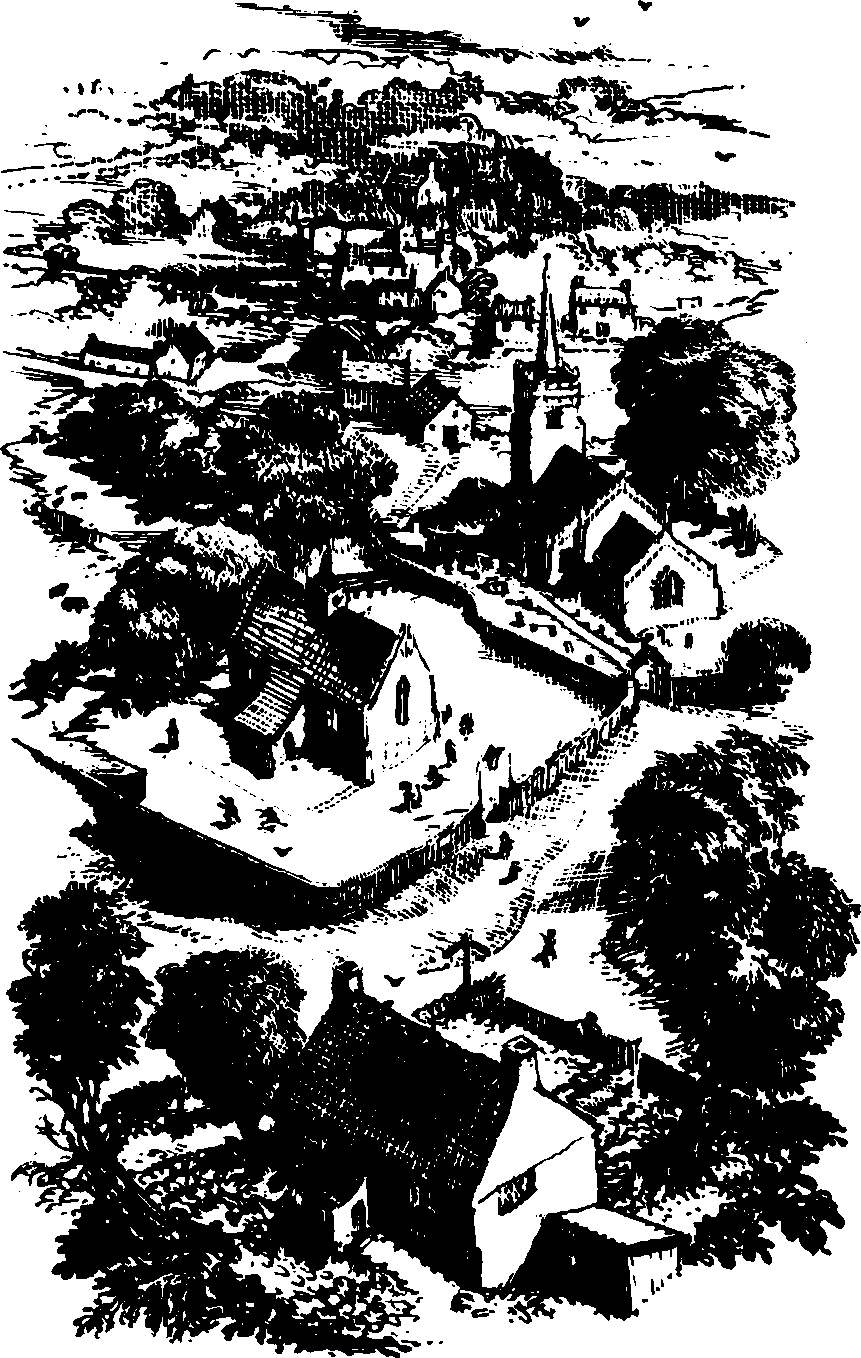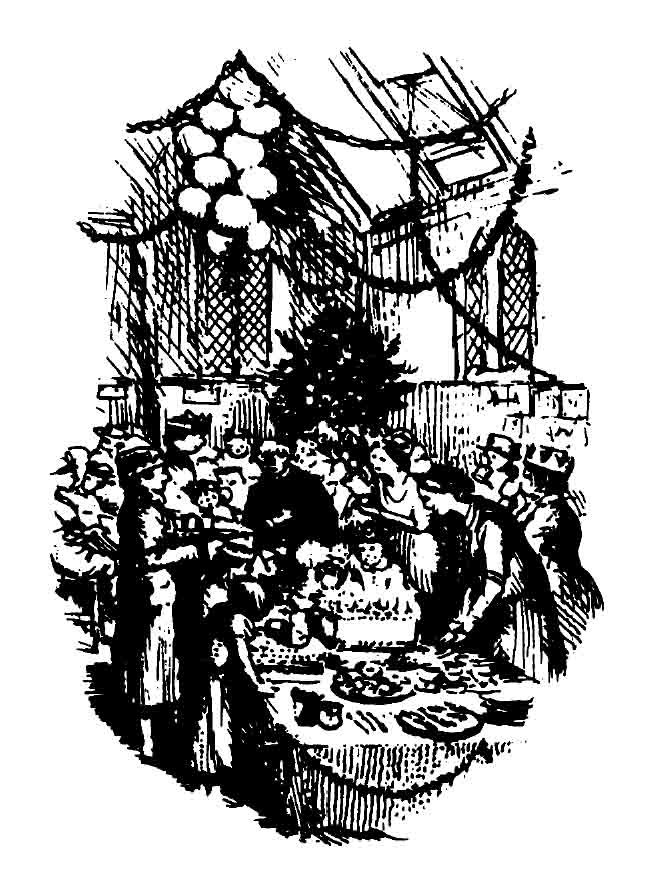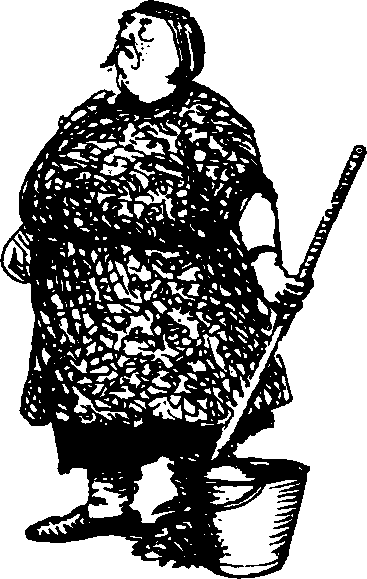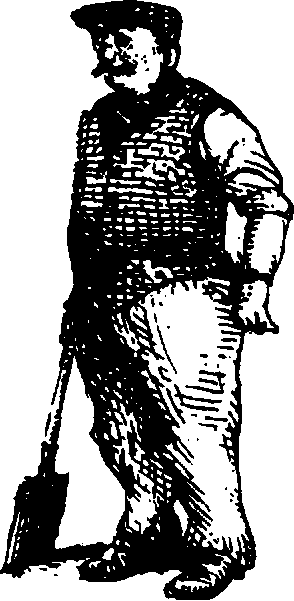Farewell to Fairacre
Read Farewell to Fairacre Online
Authors: Miss Read
Tags: #Country Life, #Fairacre (England : Imaginary Place), #Country Life - England, #Fairacre (England: Imaginary Place)

A NOVEL IN THE BELOVED FAIRACRE SERIES
Miss Read

Illustrated by J. S. Goodall
HOUGHTON MIFFLIN COMPANY
Boston New York
First Houghton Mifflin paperback edition 2001
Copyright © 1993 by Miss Read
All rights reserved
For information about permission to reproduce selections from
this book, write to Permissions, Houghton Mifflin Company,
215 Park Avenue South, New York, New York 10003.
Visit our Web site:
www.houghtonmifflinbooks.com.
Library of Congress Cataloging-in-Publication Data
Read, Miss.
Farewell to Fairacre / Miss Read;
illustrations by John S. Goodall.
p. cm.
978-0-618-15456-2 (pbk)
1. Fairacre (England: Imaginary place)âFiction. 2. School
principalsâEnglandâFiction. 3. Country lifeâEngland
âFiction. 4. VillagesâEnglandâFiction. I. Title.
PR
6069.
A
42
F
33 1994
823'.914 94-25628
CIP
Printed in the United States of America
DOH
10 9 8 7 6 5
To Eileen and Mike
with love
"If you've ever enjoyed a visit to Mitford, you will relish a visit to Fairacre."
â
Jan Karon
CHRISTMAS TERM

Term Begins
The first day of term has a flavour that is all its own.
For one thing, it invariably dawns fair and bright, no matter how appalling the weather has been in the days preceding it.
In fact, the last two weeks of the school summer holidays had been cold and rainy, washing out any plans for picnics or gardening which I had made. As headmistress of the neighbouring village school of Fairacre, I had hoped to spend the last weeks of my summer break in tidying the garden before the autumn leaves swamped the place. Now such plans had been thwarted, for I must return to my school duties.
On this particular September morning, the view from my kitchen window was bathed in sunlight. Dew sparkled on the lawn where a thrush hastened hither and thither with an ear alert for worms below. Spiders' webs decorated the hawthorn hedge with medallions of silver lace, and the branches of the old Bramley apple tree were bowed down with fruit.
Beyond this spread Hundred Acre field dotted with sheep, and farther still the misty bulk of the downs against the sky.
I was lucky to live in this pretty downland village of Beech Green. Luckier still to live in the cottage which was now my home, for it had been left to me on the death of a dear friend and colleague, Dolly Clare.
She had lived there for most of her long life, arriving at the age of six with her sister Ada, and her parents Francis and Mary Clare. It was Francis who had rethatched the cottage, and some of his tools had been used, years later, by a young thatcher who inherited them.
When Dolly told me, in the last years of her life, that she had left the cottage to me, I was overwhelmed at such generosity.
All my working life I had lived either in lodgings or in the tied school house at Fairacre. More prudent teachers had invested in property, as I should have done, but somehow I had never got round to taking out a mortgage, and the years slipped by as I enjoyed my rent-free time as headmistress of Fairacre school.
But a few years earlier, my former assistant and dear friend had left me this lovely home, and I have never ceased to be grateful.
The village of Beech Green is some two or three miles from Fairacre, and Dolly Clare had cycled there and back each school day for many years. I was luckier and had a car to shelter me on my daily journey. We get plenty of blustery winds in this open area, and Dolly must have had many rough journeys in her time, but I never knew her to be late for school, and she always looked immaculate in the classroom, no matter how severely the elements had battered her on the way there.
The kitchen clock said eight o'clock. It was time I tore myself away from all the delights before me, and set off for a new term.
Tibby, my fastidious cat, oozed through the cat-flap and surveyed my offering of the most expensive cat food on the market with considerable distaste, before walking away, and I made my way to the garage.
The morning air smelt as seductive as the flowers which scented it.
It was sad to have to leave the garden, but there was no help for it.
Term had begun, and I must be on my way.
At first sight, Fairacre school looked much as it did a hundred years ago. A low one-storey building with Gothic windows and porch, it did its Victorian best to imitate St Patrick's venerable pile near by.
The playground was dappled with sunshine and the shadows of lofty trees in the vicarage garden next door. In one corner stood the pile of coke which would soon be needed for the two tortoise stoves inside.
A few children were already rushing about in the playground, and one or two of the most effusive galloped up to throw their arms round my waist in exuberant greeting. Such affection would be somewhat muted, I knew, as the term progressed and we all settled down to our usual workaday relationship, but it was very cheering to be greeted as if risen from the dead, and I was glad to see them in such good spirits.
My curmudgeonly school cleaner, Mrs Pringle, was not quite so welcoming.
'That skylight,' she told me dourly, 'has been up to its old tricks again.'
I thought that Mrs Pringle was also up to her old tricks, damping any enthusiasm she encountered on this bright new morning. The skylight was an enemy, of many years standing, to us both.
'Anything special?'
'All this 'ere rain has done its worst,' she informed me with satisfaction. 'Dripped all over your ink stand, run under the map cupboard, and nearly got to
my stoves.'

Here her voice rose in a crescendo and her jowls grew red and wobbled like a turkey-cock's. The two tortoise stoves at our school are the idols of Mrs Pringle's life, and she ministers to them with love and blacklead and all the considerable power of her elbow.
'I'll get Bob Willet to have a look,' I promised her.
Bob Willet is our school caretaker, sexton and gravedigger at St Patrick's church, and general handyman to whoever is in need of his services in Fairacre.
He is an expert gardener, a steady church-goer and a good friend to all. Our village, without Bob, would lose its heart.
But Mrs Pringle was not to be placated so easily.
'I can't be everywhere at once. I come up here twice a week regular all through the holidays, and there's not many school cleaners as can say the same. I've worked my fingers to the bone for all these years, as well you know, and for what thanks?'

I looked at Mrs Pringle's fingers which were nowhere near the bone, but rather resembled prime pork sausages.
'Well, I thank you. Often.'
'But do those dratted kids?'
At this point a posse of the dratted kids appeared in the doorway, beaming broadly.
'It's bell time, miss. John Todd says it's his turn, but he done it last morning of term.'
'Did it,'
I corrected automatically. Not that it would make the slightest difference, but once a teacher always a teacher.
'Anyway,' I added, 'it's a new start today, so Eileen may ring the bell.'
Term had undoubtedly begun.
Ever since I arrived at Fairacre some years ago, we have had the threat of closure hanging over our heads.
It is a two-teacher school and seems to have been so for most of its long life. When I came, the numbers were between thirty and forty on roll, but early log books show that occasionally the school numbered around a hundred pupils.
In those days families were large. It was nothing to have four or five children from the same family under the school roof at the same time. Also, of course, children stayed until the age of fourteen, but in these rural areas it was not uncommon for them to leave at twelve if they had been offered a post. Most of the boys went into farming, and most of the girls into service.
During my time, my schoolchildren ranged in age from five to eleven years, and after that they proceeded to George Annett's care in the school at Beech Green where they stayed until fifteen.
The plight of our falling numbers over the years was a constant headache, and only a year or two earlier they had fallen to about twenty. My assistant teacher, Mrs Richards, who taught the infants, and I thought that the outlook was gloomy.
But amazingly help was at hand. Two new houses in the village were bought by a charitable housing trust, part of the Malory-Hope foundation, the brain-child of a much-loved local philanthropist. One house was already occupied. Here a married couple in their forties were in charge of four children, the youngest five years of age and the eldest ten. All four had been at Fairacre school now for one term, and were welcomed by Mrs Richards and me, as well as all those who had the welfare of our school at heart.
The other house was awaiting five children, but one would be a baby. Nevertheless, the thought of four more children, of school age, to swell our numbers in the near future was decidedly heartening.
There had been some plumbing problems with the second house which had held up the arrival of the second family, but we all hoped that we should see our new pupils by half term, at the end of October, or certainly by Christmas.
The Trust had been set up, some years earlier, by a wealthy and philanthropic business man. It began as a housing scheme for the orphans of men who had served in the armed forces, and today it still gave such orphans priority. But as the Trust's work expanded, other children were accepted, and the founder's basic desire for family units was respected. Not more than five, and usually four, children were looked after by a married couple in a small home. They attended the local schools, and took part in general activities, and the regime seemed to work admirably.
I must admit that when the news broke in Fairacre that two families would be housed in the Trust's latest acquisitions, there were a few misgivings from the older inhabitants. Mrs Pringle, of course, was one of the gloomier forecasters.